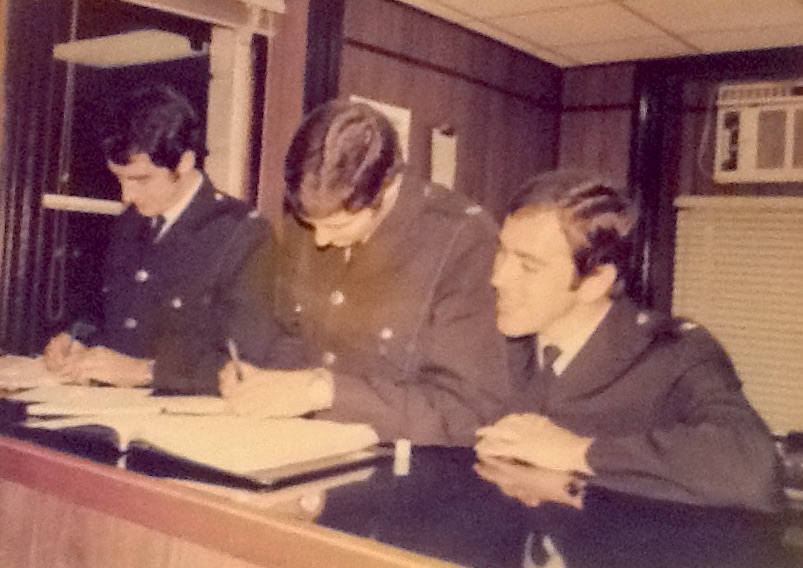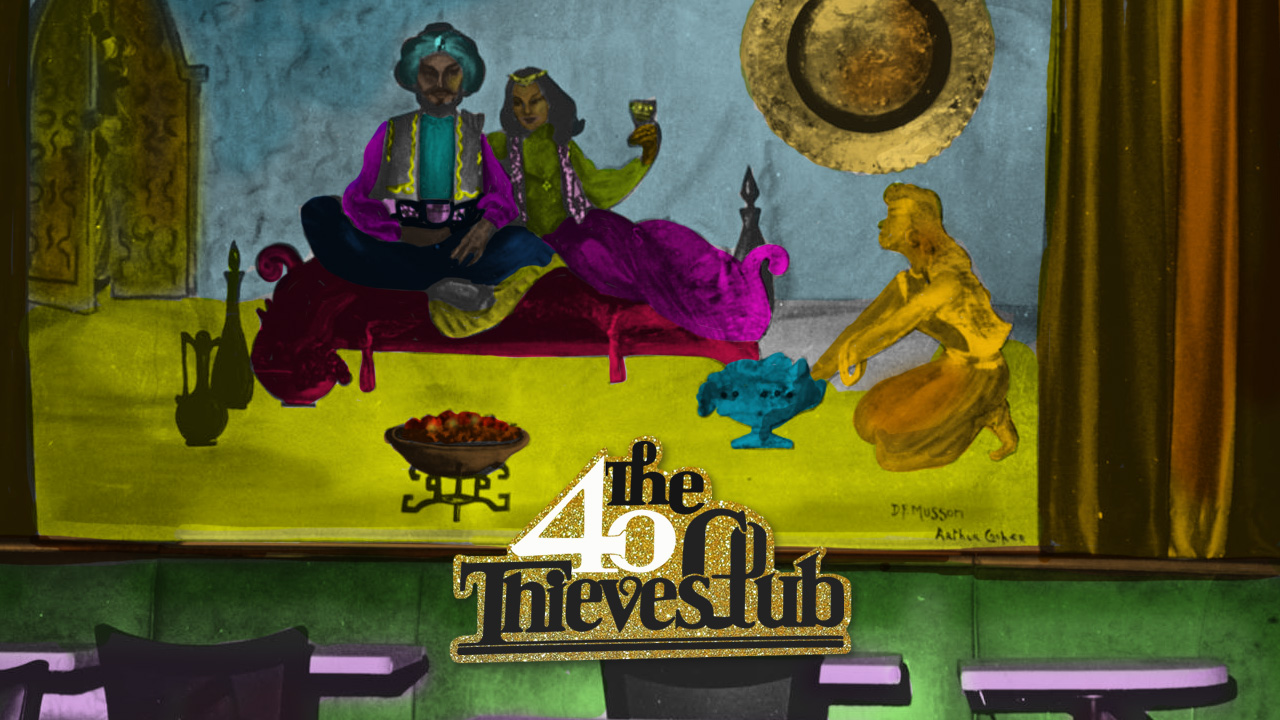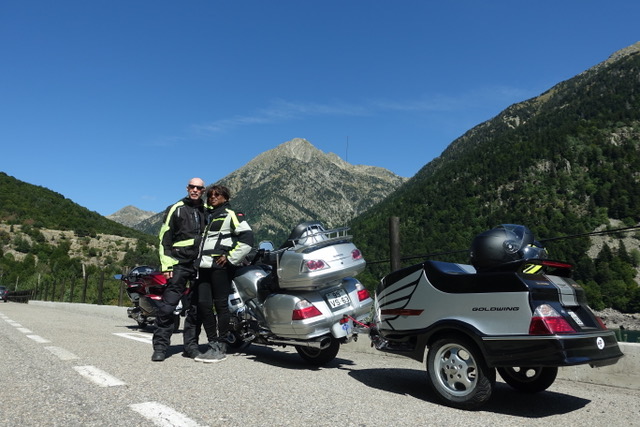 (l-r) P.C.'s John Headey, Iain Morrison and Lincoln "Linc" Pratt
(l-r) P.C.'s John Headey, Iain Morrison and Lincoln "Linc" PrattSt. George's Police Station
Just a few weeks ago we received this rather unremarkable, and slightly out of focus photograph of 3 “bobbies” in a police station. I was not all that impressed but I was made aware that the three young constables, from left to right, are John Headey, Lincoln “Linc” Pratt on the right, and Iain Morrison in the centre writing furiously! The photo might not be impressive but I was assured that the events of that evening were far from routine.
So what was this all about? John Headey stretched his mind back to 1976 when all three of these young men were stationed down East where the photo was taken at the front desk of St. Geroge’s Police Station.
In John’s own words-
“If my memory serves, Iain and I were on ‘Districts’ patrol in the much loved Morris Marina.
Report of a prowler at a house called ‘Royono’ on St Davids. Memory fades a little here but we attended - I think Pete Giles came in another patrol car.
The house backed on to a small inlet with a tiny island about 40 yards offshore. The complainant was upstairs, and on opening a window pointed to the island and said the prowler had swum across and was on the island. A small nearby skiff was manned and duly rowed to the island - confess I can’t remember who ‘manned’ it but don’t think it was me.
The prowler tried to swim away but was pulled from the water. I put cuffs on him and put him in the back of the Marina. We noticed he was of small stature. It later transpired he was a Native American serviceman.
As Iain and I drove back to St George’s with the prisoner in the back seat, we got a message about a ‘just stolen’ Mobylette believed to be leaving St George’s. Sure enough as we approached Mullet Bay the stolen bike passed us going the other way.
We braked, the rider saw us, dropped the bike and ran off across the road into a nearby wooded area. I ran after him and caught him, Iain close behind. I got the rider on the ground and reached for my cuffs - then remembered they were on the guy in the car !
Fortunately, Iain was close behind me so we cuffed the ‘new ‘ prisoner and took him back to the car. We ‘threw’ him in the back and set off again for St George's. After 100 yards or so we realised ‘something was missing’ ! The first prisoner - the prowler - had done a runner whilst we dealt with the cycle thief. We called in the details and proceeded to take prisoner 2 to St Georges, planning to return and search for our handcuffed prowler as soon as possible. After leaving prisoner 2 in the cells, we were returning to the scene of the ‘escape’ when a message came in from a nearby householder to the effect that he had a somewhat strange and slightly distressed man on his verandah.
We attended the address and found a somewhat distressed escapee crouched in the corner. He had tried – unsuccessfully - to manoeuvre his hands from behind him and had got ‘stuck’ partway. Why he had decided to go to this particular house I have no idea.
We placed him again in the back of the car - leaving him in his self imposed crouch.
This is the best bit for me! On arrival at St Georges the prisoner was taken from the car and, still in the ‘crouch’, ‘waddled into the Station. Linc Pratt was station constable and as the prisoner entered, Linc, who had been aware of all the circumstances, leaned over the counter and said, “You’ve got the wrong man, the one we’re looking for is five foot eight!” We fell about laughing of course. The prisoner was eventually handed over to the US authorities. The photo is of us filling in our notebooks later that same night, with dry humoured Linc adding his inimitable asides. The only remaining question is, who took the photo? It might have been ‘Rigor’ Morris who was our shift sergeant I think, but confess I can’t remember.Great memories.
John Headey”
When first shown this photo a few weeks ago Iain Morrison had a problem remembering when and why the photo was taken, but on reading John’s account he wrote to say:-
“I remember the 'night shift' prowling incident, and in particular the house named - "Royono". Was it Royono Cottage?? I recall the arrest for prowling of the US serviceman, located hiding in the water not far from the complainants residence..... followed thereafter with the arrest of the rider of the stolen cycle, who was heading out of St George's as we were heading back to the station with the prowler prisoner. I don't remember all the details you have outlined John, and I definitely don't remember ever manning a small boat and rowing out to an island???? I do remember Pete Giles also being there.
As I stated previously, I have never seen the photo before and therefore have no idea who took it.....but it probably was Watch Sgt. John 'Rigor' Morris. Makes sense that we would later be there together in the station filling in our notebooks, covering the two incidents......with evil eyed Linc watching over us with a smirk on his face ha ha!!!! Not sure either that I recall receiving a letter of 'Good Work Done', as recommended by Insp. George Garrod - a good man.........but I guess I must have done.
Wonderful memories as you say John, working at a good station, with good people at a fun time in the BPS. Thoroughly enjoyed my 3 years in Eastern Division before moving to Traffic and then later to SB, where I remained until I retired.
Iain Morrison"
I believe John had not been in touch with Iain or with Linc Pratt for many years and they were delighted when we were able to put them all in contact with each other. When he read John's account of the events of that night in St. George's Linc agreed this is a “good story from the very good days” and was amazed that John and Iain could remember the night in such detail.
________________________________________
As a result of having these three guys communicating with each other about the above, we asked them to let us know where they are, and how they're doing these days (in February 2022). They were forthcoming in providing the information below;
JOHN HEADEY
P.C. John Headey
John Headey served here from 1971-1977 in Eastern Division, and while here he married his wife, Susan. We have previously reported on John and the fact that his Bermuda-born daughter Lena has played Queen Cersei Lannister in Game of Thrones . CLICK HERE for our Expo article on “Royalty and Loyalty”.
John has written the following:-
Lena and our two Grandchildren ( Wylie now 11, and Teddy Rose, 6 ) are currently living in New York having been in LA and London at different times in recent years. She has to go where the work is. They were here for a Covid interrupted Christmas and we hope to visit them in the not too distant future. (See my note re travelling below!)
Here’s a photo of Susan and I with our son Tim, - in a pub for a change!
John and Susan with their son Tim - in a pub!
Tim is a train driver for Northern and seems to be enjoying life. He’s highly thought of by his employers so his future seems assured.
There’s not a lot to tell about us which I haven’t mentioned in previous messages. Susan would still like to travel, but I’m not keen. 23 years of business travelling and numerous post retirement trips to LA along with 2 visits to friends in Australia have all contributed to my dislike of airports and flying.
It’s our 50th Anniversary in May - we married in Bermuda - so I’m under a bit of ‘subtle pressure’ to take Susan back for a visit - we’ve not been back since we left at the end of 1976.
Lena bought a large Grade 2 listed house not far from us a few years back and it is now used for short term lets. I’m involved with the running and maintenance of that which helps to keep me busy. It sleeps up to 17 and we are pretty busy with bookings so whilst not ‘full time’ as such, my days are often ‘full’.
I’m still supporting Huddersfield Town, something like 65 years now, man and boy. I have a few supporter friends of a similar age . It’s really crazy that at our age the performances and results still mean so much. We should know better but I guess you can’t break the habits of a lifetime.
As I write, Paul Hendrick, who now lives in Spain, is in town visiting his family and I’m taking him to the game this weekend - Sheffield United - don’t fancy our chances.
Editors note - As a Stoke City supporter I’m sometimes in touch with John about our respective football teams, with both in the Championship. A couple of weeks ago Stoke travelled to Huddersfield and the two drew their encounter.
We are definitely ‘punching above our weight’ and I strongly suspect Stoke will finish above us. As we were pre-season favourites for the drop, our current position defies common sense. However, on the plus side Town have a reputation as a well run Club which helps with things like loan players from the bigger clubs, we currently have 2 from Chelsea.
We have also, like Stoke, progressed to the fifth round of the FA Cup and have been drawn against an in - form Nottingham Forest. Remember they thrashed Leicester City in the previous round so I suspect your chances of beating Crystal Palace are better than ours! My eternal pessimism again!
Unfortunately our owner(s) - currently under some negotiations - don’t have the financial clout of the Bet365 Group which you have at Stoke. We have however in recent years been kind enough to pass on Tom Ince and Tommy Smith to you guys.
I’m sure you are eternally grateful!
Cheers,
John,
IAIN MORRISON
P.C. Iain Morrison
Iain Morrison joined the Bermuda Police in 1973 after serving in the Staffordshire County Police from 1969 - 1973 as a Cadet and then as a Constable. He served in Central (Uniform) for 2 years before transferring to Eastern (Uniform) where he was working at the time of the above incidents. He was assigned to Operations (Traffic) from 1979 – 1984 before being posted to Special Branch where he remained until he retired from the Service in March 2007.
Iain and his wife Jennifer (nee Kempe), along with their two children, Calum and Alanna, who were both born here in Bermuda, headed off to Scotland after Iain retired and spent the next decade or so living in Scotland (Banchory, Aberdeenshire and Edinburgh).
Iain has written to say,
"Having returned to the island to live in 2017, after a number of years in Scotland, Jennifer and I now spend our time between Bermuda and Edinburgh. We generally try to get away from 'the rock' for the humid summer months and spend the winters on the island.

Iain & Jennifer with daughter Alanna, taken in Bermuda
Summer 2018 at a family wedding
After living/working in Seville, Spain for 6 years after university, our son Calum (31yrs) returned to the island to live in January 2021. This was always on the cards at some point, but having lost his job during the height of Covid, he decided to return earlier than planned. Fortunately, he has been able to secure employment in the re-insurance sector and is enjoying life back on the island. Daughter Alanna (28yrs) is still working in the Super yacht industry and her boat is presently wintering in Antigua.
 Alanna, Iain, Jennifer & Calum taken in their garden in Bermuda in June 2021.
Alanna, Iain, Jennifer & Calum taken in their garden in Bermuda in June 2021.
For my sins, I am still a staunch Stoke City supporter. Hoping - yet not particularly confident, that they might make the Championship playoffs this year. In American football terms, I have always supported the Cincinnati Bengals - and am excited at the prospect of them making their first Superbowl appearance since 1988. The franchise has never won the Superbowl, so fingers crossed for 13th February 2022 when they meet the Los Angeles Rams.
I have managed to keep in touch with Linc Pratt via annual Christmas cards.
Keep up the good work.
Iain
LINCOLN 'LINC' PRATT
P.C. Lincoln "Linc" Pratt
The photo below is Linda and I on our ruby wedding anniversary celebration with daughters Helen and Danielle and son Chris.
Linc and Linda with their children
(l-r) Helen, Linda, Linc, Danielle and Chris
We have aged a bit since then but it was a conveniently decent photo to share.
So Linda and I live on the outskirts of Ipswich in an up-market park home development with a 9 hole golf course and immediate access to the foreshore of the River Orwell. Been here 5 years and love it as does our standard poodle Dempsey who relishes his runs on the foreshore.
I retired from Suffolk Constabulary as an inspector in 2006 and since then have been casually employed as a role actor and assessor in police recruit assessment centres. I used to work away from home but since the pandemic I work online for the College of Policing, in fact I am in the middle of a four day contract this weekend.There still is no face to face assessing as far as I know. I also am an independent member of a final selection panel for prospective foster carers. I didn't get 30 years in for pension as I was a late (age wise) joiner, so the extra income does help make up for my lost three years.
We have 7 grandchildren ranging from 4 years to 17 years, one girl, the eldest and 6 boys, all mad crazy on football.
Linda keeps busy with the grandchildren especially making their birthday cakes always specific to their requests. Grooming Dempsey every two months is also one of her jobs so to speak. She is also chief gardener which she loves. 80 square yards of artificial grass means I have sold the lawn mower and good riddance!!
We both play golf, not necessarily well but enjoy it enormously .
I joined Lodge St.George 200 when I was in Bermuda and have enjoyed freemasonry over the decades in my local lodge in Ipswich.
We have not returned to Bermuda since leaving in 1978 but plan to visit in 2024 to celebrate our golden wedding anniversary. I have two sisters in USA, one in Florida and one in Kansas and visiting them has consumed a lot of our long haul visits.
Pete Giles joined us in Florida for a couple of days a few years back in the same complex where Brian and Carol Foster were living. We are all booked up to spend all of July there in The Villages as long as COVID carries on waning.
Best regards to you all.
Lincoln and Linda
EDITORS NOTE - With refarence to Iain being a Stoke City fan, I must confess to having the same allegiance to The Potters, and I hear on good authority that Frankie Foggo is also a Stoke City fan, due apparently to being "brainwashed" by Iain when they worked together!
Marian puts the finishing touches to my Stoke City Bermuda kite
My wife Marian happens to be an "ACE" Bermuda kite maker and as some of you will know, there was a time when Stoke City were fying high in the Premiership, and I managed to persuade Marian to make me a SCFC kite to fly on Good Friday. The kite flew to perfection, but I seem to remember we were demoted the next season and I havn't requested another one since then. Just waiting for promotion back to the Premiership!
 Roger with his Stoke City kite - waiting for promotion!
Roger with his Stoke City kite - waiting for promotion!
 The 40 Thieves Club
The 40 Thieves Club











